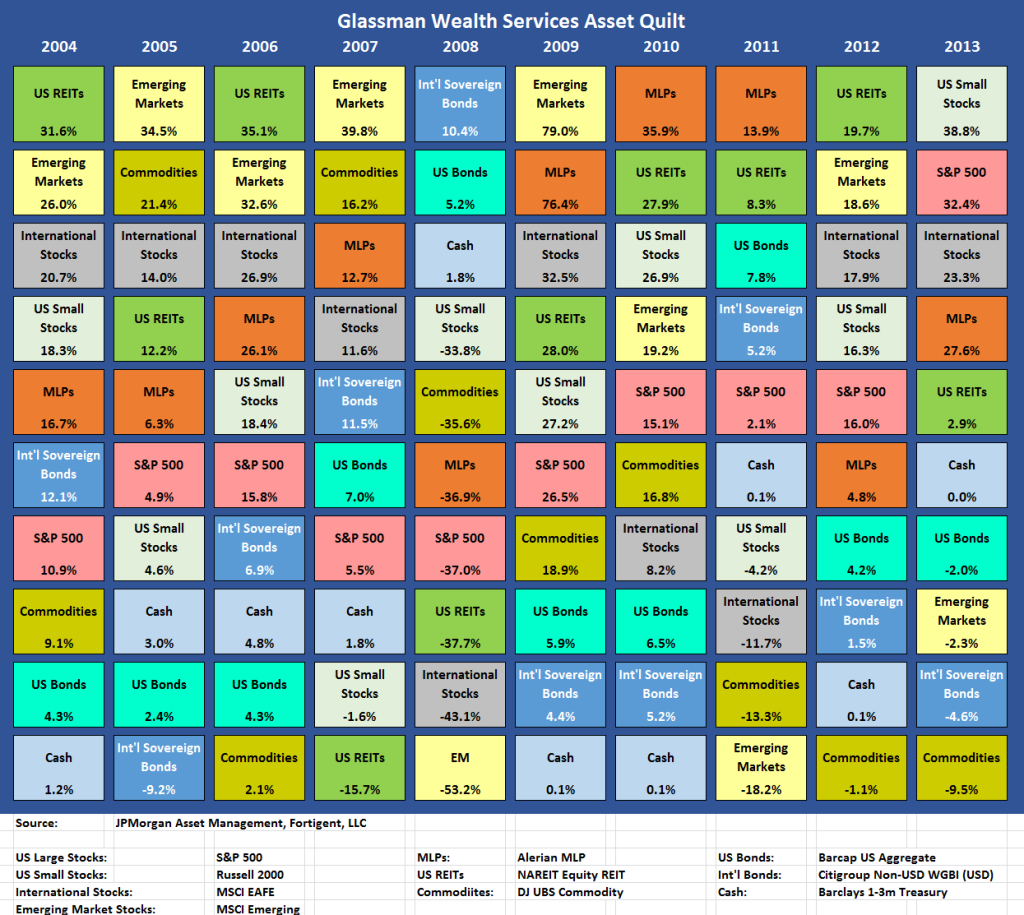4 Mistakes to Avoid When Investing
1. Chasing Investment Performance
How about this for an investment strategy: Look at what performed best last year and make this year’s investments based on that hindsight knowledge with the expectation this outperformance will continue into the future. That doesn’t sound very smart does it? But that’s what too many individual investors do. It’s all too easy to look at what happened in the markets and use that past success for making investment decisions for the future. For example, last year, small company US stocks were the best performing asset class, gaining 39%. Commodities, on the other hand were the losers, down 10%. This year, through June 30, 2014, US small stocks are up a measly 3% while commodities are up 7%. From 2004 to 2007 emerging market and international stocks trounced US stocks, just long enough to convince investors to add or increase their investments in these areas. Then in 2008, emerging markets dropped 53%, and international stocks fell 43%. Again, from 2009 to 2012 emerging markets outperformed US markets and investors felt left out. They wanted more emerging markets, believing in the long-term China growth story, and many now regret that decision. My point is not that emerging markets are bad, but instead, that chasing last year’s hot dot is dangerous. The consistency of out performance by a sector, a country or even a region of the world doesn’t usually last for years and can reverse abruptly. The asset quilt chart below is a great visualization of the rise and fall of these assets each year.
2. Chasing Investment Managers – The Five Star Fund Effect
Now that you’ve decided where to invest your hard earned money, what investments will you use? If you choose to use an active manager and not an index mutual fund or ETF how will you decide which one? If you’re not sure what an index mutual fund or ETF is, please read my recent article: A Review of the Best Low Cost Stock Index Fund Strategies. My advice? Please don’t rely solely on Morningstar’s 5 star ratings. These ratings are well intentioned but have some inherent flaws. I believe the biggest is that the rating is a grade on past performance. It tells you what has happened, but not why. Think of the ratings as a recognition of achievement but not aptitude. Buying only 5 star funds is almost certainly guaranteeing future underperformed. Instead, do your own homework or hire an investment manager or financial advisor. If you do go it alone, then:- select managers with an easy-to-explain approach
- the discipline of having invested for a long time
- low fees
- a track record of solid performance in both up and down markets
3. Ignoring the Free Lunch Part – Diversification
Concentrating your investments in too few asset classes or stocks can be dangerous to your wealth. Let’s use just one example. Since 1980, had you been astute enough to have bought and held Berkshire Hathaway stock (run by Warren Buffett), your annualized return has been north of 20%. What you probably don’t realize is that during that period, there have been five times when Berkshire’s stock fell by more than 19%, including two times it dropped by 50%. I doubt most investors would have been able to hold on after seeing half of the value evaporate. The same is true for just about every major successful long term company, be it Microsoft, Walmart or Exxon Mobil. “Unless you can watch your stock holding decline by 50% without becoming panic-stricken, you should not be in the stock market.” – Warren Buffett
Source: A Wealth of Common Sense: Warren Buffett’s Biggest Losses
Instead of trying to guess which will be the best individual companies, like Berkshire Hathaway, and owning large positions in them, instead I suggest diversify your holdings and your exposures. To broaden your holdings, buy a mutual fund that owns at least 25 individual stocks or buy an index fund or ETF (Exchange Traded Fund) that gives you broad stock market exposure. To diversify your exposures, think about owning not only US stocks but also international stocks, US bonds, global bonds, commodities, REITs (Real Estate Investment Trusts), and energy infrastructure Master Limited Partnerships. Broadly diversifying your portfolio will help to accomplish two things. First, it reduces the overall ups and downs of the portfolio. This increases your sleep-at-night factor. Second, it helps you stay on track toward your investment goals. This is like the difference between the tortoise and the hare – diversification is the tortoise, concentrated investing is the hare. We all know who won that one!


